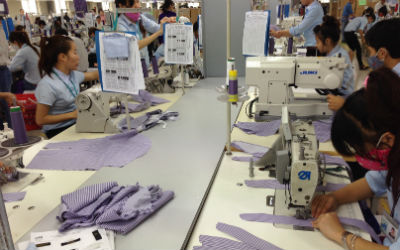INDOCHINA INTERNATIONAL CONSULTING CO., LTD
HO Add: 62L/36 Nguyên Hồng, Ward 11, Bình Thạnh District, HCMC - Vietnam
Biz Office Add: #48 Road No 11, Quarter 6, Hiệp Binh Chánh Ward, Thủ Đức, HCMC - Vietnam
®Source: http://viipip.com should be clearly quoted for any use of information extracted from our website.
Publication permit No: 60/GP-TTĐT , April 05, 2010.


illustration photo
Article 10 of the draft currently discussed by the National Assembly explains that state capital shall be used for establishing enterprises providing essential products and services, operating in industries in service of national defence and security, operating in state monopolies, and enterprises with high technology and large-scale investment that can serve as an impetus for other sectors to develop.
However, many National Assembly deputies have expressed doubts, saying the proposal was so broad it would continue to allow the state and state-owned enterprises (SOEs) to do business in a huge variety of sectors, particularly when many SOEs were operating inefficiently.
Deputy Tran Ngoc Vinh from Haiphong city said the scope for state investment in Article 10 was “too broad”. It was also difficult to define the list of sectors in need of large-scale investment, and serving as a propellant for other sectors to develop. “Therefore it is vital to clarify the sectors that will wholly need state capital, the sectors that will partly need state capital, and the sectors that will need no investment from the state.”
“No government in the world like Vietnam wants to pour money into business, except for into key sectors,” said deputy Ngo Van Minh representing Quang Nam province. “Vietnam’s government should not invest for profit. I strongly recommend that the National Assembly reconsider this regulation.”
“What are essential products and services? I think it is necessary to have thorough quantitative analysis about these sectors, so that the state will not be able to use the term ‘essential’ as a pretext for all products and services, in order to hold a monopoly,” echoed deputy Do Van Duong from Ho Chi Minh City.
Currently SOEs operate in almost all economic sectors and monopolise production of the economy’s key products, with telecommunications (91 per cent), insurance (88 per cent), fertilizer (99 per cent), coal (97 per cent), gas and electricity (94 per cent).
“The state should focus its investment in national security and defence, not necessarily in essential and high-technology sectors which are currently done very well by local and foreign private enterprises,” said deputy Ha Sy Dong from Quang Tri province.
The regulation was actually discussed in May this year by the National Assembly, but almost nothing has been revised since then. At that time, the National Assembly’s Chairman Nguyen Sinh Hung stressed that the regulation would continue discouraging private enterprises from engaging in sectors currently dominated by the state and SOEs.
“Everything can be defined as being essential to society, from clothes, machinery, cement, steel, transport to education and health care. If this regulation is applied, the state may continue controlling these sectors that private enterprises want to engage in, and this is during a period when we are boosting SOE equitisation,” he stressed. “I highly recommend that the regulation be reconsidered.”
- FDI capital continues to pour into Vietnam (6/11/2025 1:20:33 PM)
- Thanh Hoa receives good news: Preparing to have an additional industrial park of up to 470 hectares, creating jobs for nearly 30,000 people (6/11/2025 1:15:09 PM)
- Industrial Park Real Estate: Waiting for the New Generation of FDI (6/11/2025 1:10:15 PM)
- A wealthy Vietnamese city will have two special economic zones after the merger (6/11/2025 1:04:42 PM)
- 30 billion USD capital FDI in Việt Nam by 2025, a series of "ông big" races to expand the land fund (6/11/2025 12:55:26 PM)
- the 2nd largest city in the North will start construction on an international economic zone (6/11/2025 12:50:20 PM)
- Japanese giant Sumitomo continues to want to build an industrial park in the countrys fourth smallest province. (6/11/2025 12:40:45 PM)
- 3 foreign corporations want to invest billions of dollars in Ba Ria - Vung Tau (6/11/2025 12:34:30 PM)
- Lotte Group member starts construction of nearly 1,000 billion VND logistics center in the province with the most industrial parks in Vietnam (6/11/2025 12:33:26 PM)
- Forming a regional center for manufacturing spare parts and components (6/11/2025 12:24:08 PM)
- Vietnams first wafer factory is about to start construction (6/11/2025 12:19:09 PM)
- Dong Nai attracts foreign investors (6/11/2025 12:13:27 PM)
- Tay Ninhs largest industrial park welcomes a $150 million high-end knitted fabric factory project (6/11/2025 12:11:00 PM)
- (6/11/2025 12:09:10 PM)
- Vietnam will become a destination for Chinese investors in the future (11/6/2023 1:03:19 PM)

- FDI capital continues to pour into Vietnam
- Thanh Hoa receives good news: Preparing to have an additional industrial park of up to 470 hectares, creating jobs for nearly 30,000 people
- Industrial Park Real Estate: Waiting for the New Generation of FDI
- A wealthy Vietnamese city will have two special economic zones after the merger
- 30 billion USD capital FDI in Việt Nam by 2025, a series of "ông big" races to expand the land fund










 ADB: Vietnam’s 2009 GDP growth to be highest in South East Asia
ADB: Vietnam’s 2009 GDP growth to be highest in South East Asia MGM Grand Ho Tram: Vietnam’s First ‘Las Vegas Style’ Integrated Resort
MGM Grand Ho Tram: Vietnam’s First ‘Las Vegas Style’ Integrated Resort Nha Trang’s Twin Towers project licenced
Nha Trang’s Twin Towers project licenced Foreign investors still have good opportunities in Vietnam
Foreign investors still have good opportunities in Vietnam Sierra Wireless gets a foot in Vietnam’s ICT market
Sierra Wireless gets a foot in Vietnam’s ICT market